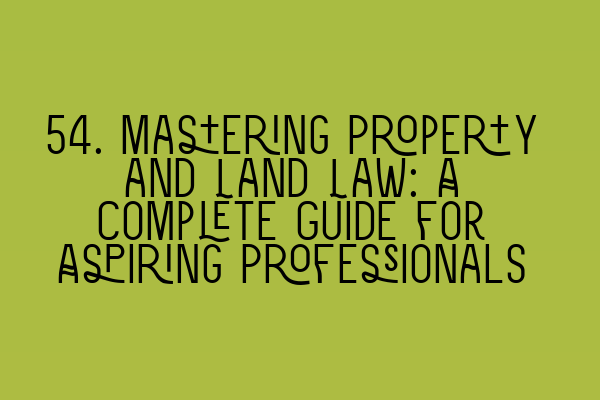Mastering Property and Land Law: A Complete Guide for Aspiring Professionals
As an aspiring professional in the field of property and land law, acquiring a deep understanding of the subject matter is crucial. Property law deals with the legal aspects of ownership, transfer, and protection of properties, while land law focuses specifically on the legal principles surrounding land ownership and use. To excel in this field, it is essential to master the intricate details and nuances of property and land law.
The Importance of Property and Land Law
Property and land law form the foundation of our legal system when it comes to buying, selling, and managing land and properties. These laws ensure that ownership rights are protected, disputes are resolved fairly, and transactions are conducted smoothly. Whether you are representing buyers, sellers, landlords, tenants, or developers, a comprehensive understanding of property and land law is imperative for providing effective legal advice and ensuring compliance with legal obligations.
Key Topics in Property and Land Law
To master property and land law, it is essential to familiarize yourself with the key topics that form the core of this area of practice. Some of the topics that you should focus on include:
- Ownership and Possession: Understand the different forms of ownership, such as freehold, leasehold, and co-ownership, as well as the legal rights and obligations associated with each.
- Transfers and Conveyancing: Learn about the process of transferring the ownership of property, including the legal requirements for a valid transfer, the role of contracts and agreements, and the importance of conducting thorough property searches.
- Restrictions and Covenants: Explore the various restrictions and covenants that may affect the use and enjoyment of land and properties, including easements, restrictive covenants, and positive covenants.
- Land Registration: Familiarize yourself with the system of land registration, the importance of registering property rights, and the legal implications of being a registered or unregistered landowner.
- Tenancy and Lease Agreements: Gain a deep understanding of the legal framework surrounding tenancy agreements, lease negotiations, and the rights and responsibilities of landlords and tenants.
- Dispute Resolution: Learn about the different mechanisms for resolving property and land-related disputes, including negotiation, mediation, arbitration, and litigation.
These are just a few of the many topics that you need to master to become proficient in property and land law. Each area of focus requires a thorough understanding of the applicable statutes, case law, and legal principles.
Tools for Mastering Property and Land Law
While acquiring theoretical knowledge is important, practical application is equally necessary to excel in property and land law. Here are some tools and resources that can help you master this complex area of law:
- Textbooks and Study Guides: Invest in comprehensive textbooks and study guides that cover the key topics in property and land law. These resources provide in-depth explanations, case studies, and practical examples to enhance your understanding.
- Online Courses and Training: Enroll in online courses and training programs specifically designed to help professionals grasp the intricacies of property and land law. These courses often include interactive modules, practice quizzes, and mock exams to test your knowledge.
- Legal Research Databases: Make use of legal research databases to access relevant case law, statutes, and legal commentary in property and land law. These databases allow you to stay up-to-date with the latest legal developments and precedents.
- Internships and Work Experience: Gain practical experience by undertaking internships or work placements at law firms specializing in property and land law. This hands-on experience will help you apply your theoretical knowledge to real-world scenarios and develop essential skills.
By utilizing these tools and resources, you can enhance your understanding of property and land law and develop the expertise necessary to navigate complex legal issues in this field.
The Path to Success in Property and Land Law
Mastering property and land law is a journey that requires dedication, persistence, and continuous learning. Aspiring professionals in this field should consider the following steps:
- Educational Qualifications: Obtain a law degree or equivalent qualification from a reputable institution. This will serve as a solid foundation for your legal career.
- Preparation for SQE Exams: Prepare for and pass the Solicitors Qualifying Examination (SQE), which assesses the competence of aspiring solicitors in England and Wales. You can access SQE 1 practice exam questions and SQE 1 preparation courses to enhance your chances of success.
- Specialization and Continued Learning: Consider specializing in property and land law to further develop your expertise. Attend specialized training programs, such as SQE 2 preparation courses, to expand your knowledge and stay updated with the latest legal developments.
- Networking and Professional Development: Engage with industry professionals, join relevant associations, and attend property and land law conferences and seminars. Building a strong professional network will provide you with opportunities for mentorship, career growth, and valuable insights.
- Continued Professional Development (CPD): Commit to ongoing learning through CPD programs offered by legal organizations. These programs help you stay abreast of changes in property and land law and ensure you remain proficient in your practice.
By following these steps and continually honing your skills and knowledge, you can position yourself as a trusted professional in the field of property and land law.
Conclusion
Mastering property and land law is an essential step towards a successful career in the legal profession. Through extensive study, practical application, and ongoing professional development, you can develop the expertise necessary to navigate complex property and land-related issues.
Remember, becoming a proficient property and land law professional is a continuous process. Embrace opportunities to enhance your knowledge, stay updated with new legal developments, and build strong relationships within the industry.
For more information and resources related to SQE exams and preparation courses, visit:
